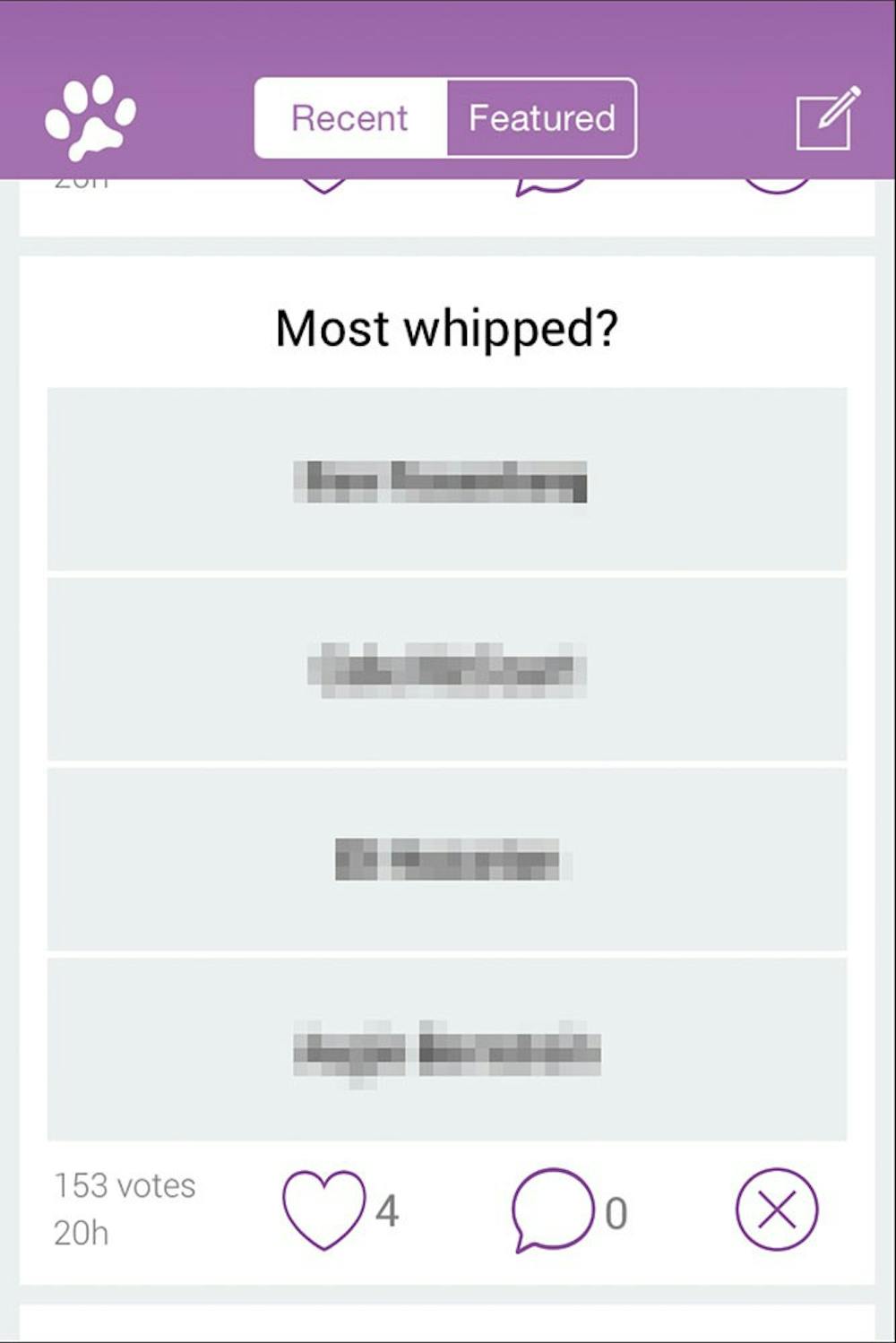
Which girls have the best breasts? Who would you rather have a threesome with? Who would you least want to be stuck in a room with? These are the types of questions being asked by users on a new app called Whatsgoodly.
Since its launch at Penn just over a week ago, the app has quickly gained popularity in the Greek community at Penn. But concerns about cyberbullying on the app have already arisen.
“One of my friends deleted the app because she was on it and she was so offended by [it],” Wharton freshman Tali Vogelstein said. “When they ask questions like who’s hotter, who’s uglier, whose dick’s dirtier, that’s just mean and disgusting,” she added.
Some questions on Whatsgoodly are specifically limited to male and female respondents. Founder and recent Stanford dropout Adam Halper said the app was intended to allow students to share their opinions on issues. He thought up the idea for the app while debating a question with friends in a dorm room.
Halper, who was in his second year at Stanford University when he dropped out this spring to pursue Whatsgoodly full time, said he began to develop the app over the summer as he attempted to learn how to code. He said he received assistance from a tutor he met online, though he eventually scrapped the code they worked on together and rebuilt the app from scratch.
In the fall, when he returned to school, he brought on co-founder and fellow Stanford sophomore Christopher Sebastian and an advisor who had recently graduated from Stanford and had his startup acquired by a major San Francisco tech company.
Halper said the app’s purpose is to allow people to share information and answer questions. In the company’s project overview on AngelList, a platform that connects angel investors with startups, the team wrote, “Whether students want to know what bar everyone’s going to tonight, or which class has the more interesting professor (or less homework),” Whatsgoodly is an app for them.
Halper said his team is working to prevent malicious content by using moderators to delete inappropriate posts. The app also allows users to flag inappropriate content so it can be deleted and so the poster can be banned. Halper said that as Whatsgoodly’s audience has grown, the quality of the posts has too, citing Stanford and other schools that were early adopters. He described the negative content as a “growing pain” for the company.
“Users, if they continually abuse the feed, then we have to suspend them. But generally we’ve noticed that users just kind of self-regulate after that initial period and content overall becomes a lot more high quality, interesting, meaningful and less about bullying and targeting specific people,” he said.
The app initially launched at Stanford’s Sigma Alpha Epsilon fraternity, before spreading to Chapman University and University of California San Diego. Now the app has spread to colleges including New York University, Columbia University, University of Michigan and University of Virginia, among other schools. College sophomore Kamber Moss helped bring the app to Penn, which he started promoting at his fraternity, Theos.
Moss said he initially heard about the app from Halper, who he knew from high school at the Brentwood School in Los Angeles. Now, as the campus representative for the app, he hopes it will spread beyond the Greek community.
Moss said his favorite poll was one that asked which sorority would win in a fight. He said Alpha Chi Omega won the poll.
Moss uses the same term as Halper to describe issues with content, calling them “growing pains.”
“Most of the really mean comments — not like the lighthearted comments, but the really mean comments ... let’s say like 95 percent of the user base does not make those comments, but like 5 percent do, so their accounts just get banned,” Moss said.
“Closely monitoring the polls is just the best way to combat that,” he added, “and as we’ve seen with the Stanford growth, when you start with a really small base, there are a lot of inside jokes and jokes about specific people, but as the base grows, the questions start to encompass a lot more people and you don’t get as many specific person questions.”
However, a sophomore — who asked to remain anonymous because of her sorority affiliation — said the controversial nature of the posts is key to Whatsgoodly’s success.
“It’s interesting to see things that are hurtful to other people. The more controversial it is, the more views it’s going to get,” the sophomore, who has been mentioned on the app, said.
“The more restrictions they put on the questions that people ask, the less people are going to be offended, and the sooner it’s going to die out,” she added.
As a result, she believes the app’s future comes down to a decision about whether to prioritize the business interests of the app and the interests of the general user base, or the interests of the people who are mentioned in the app.
“There’s a decision to be made with regards to whether the entertainment of the many is worth the hurt that this is going to inflict on the few,” she said.
She said the app contributes to insecurity, both among those who are mentioned, and those who are not. “The funniest thing is that people are actually offended that they aren’t mentioned,” she said.
The sophomore compared the app to Notice, an anonymous messaging board that was popular last year. “It kind of just faded away,” she said of the app. “Eventually, I think they all do.”
When asked if she will continue using the app, the sophomore said, “Yes, until the questions get boring.”
The Daily Pennsylvanian is an independent, student-run newspaper. Please consider making a donation to support the coverage that shapes the University. Your generosity ensures a future of strong journalism at Penn.
DonatePlease note All comments are eligible for publication in The Daily Pennsylvanian.







